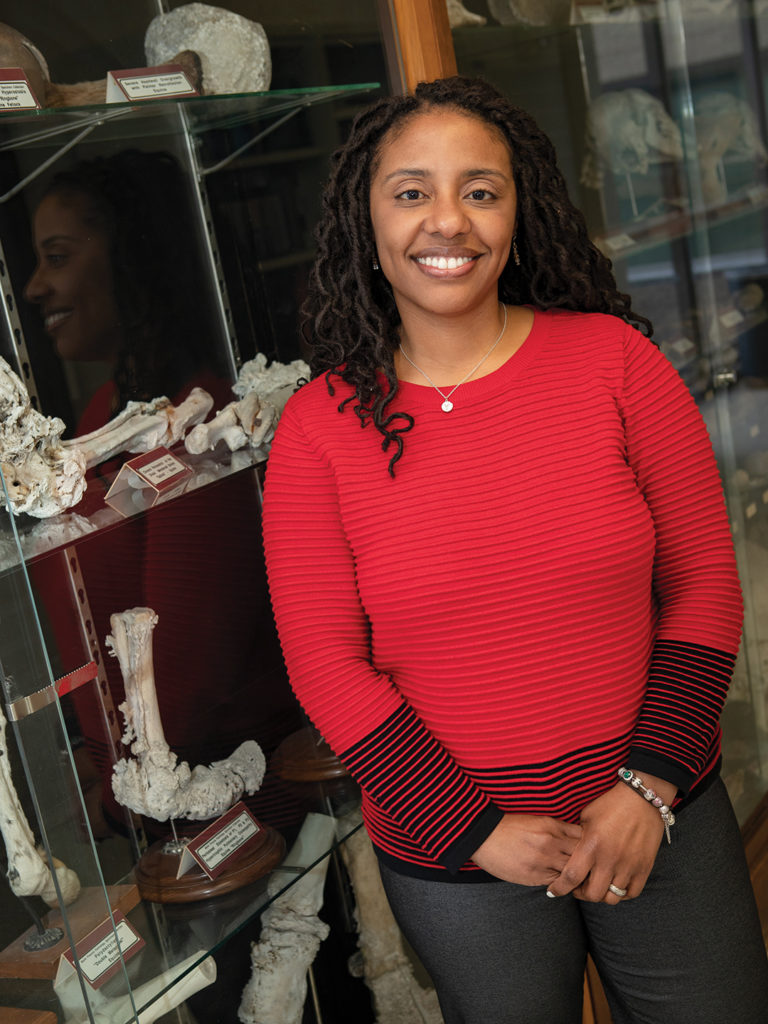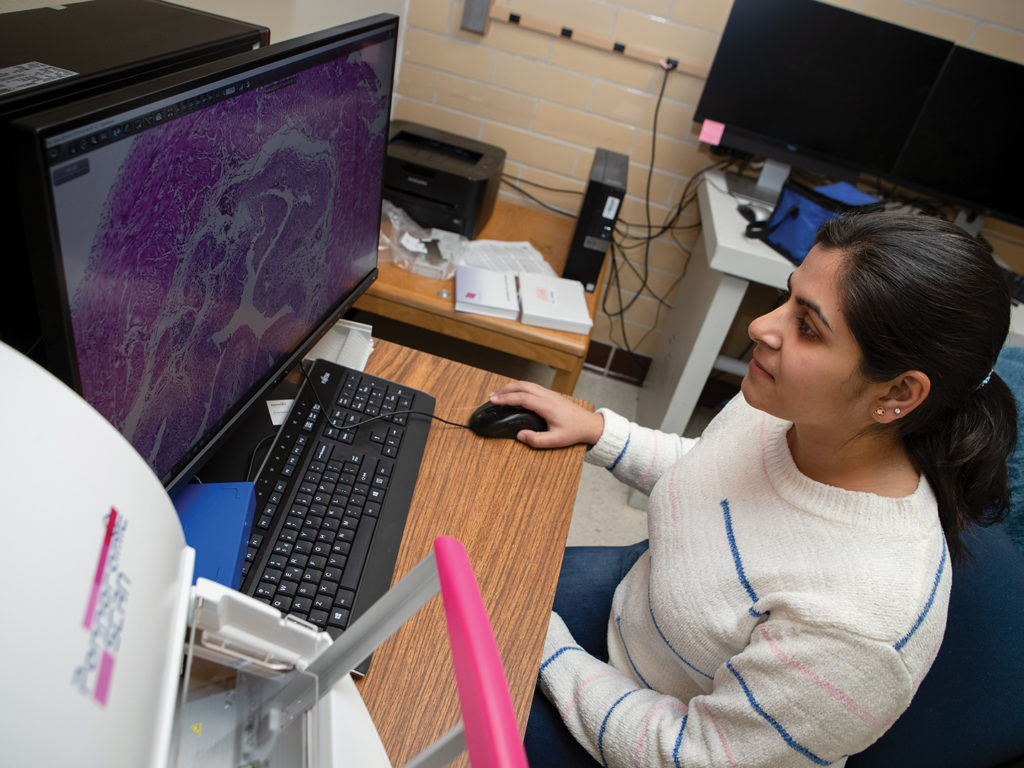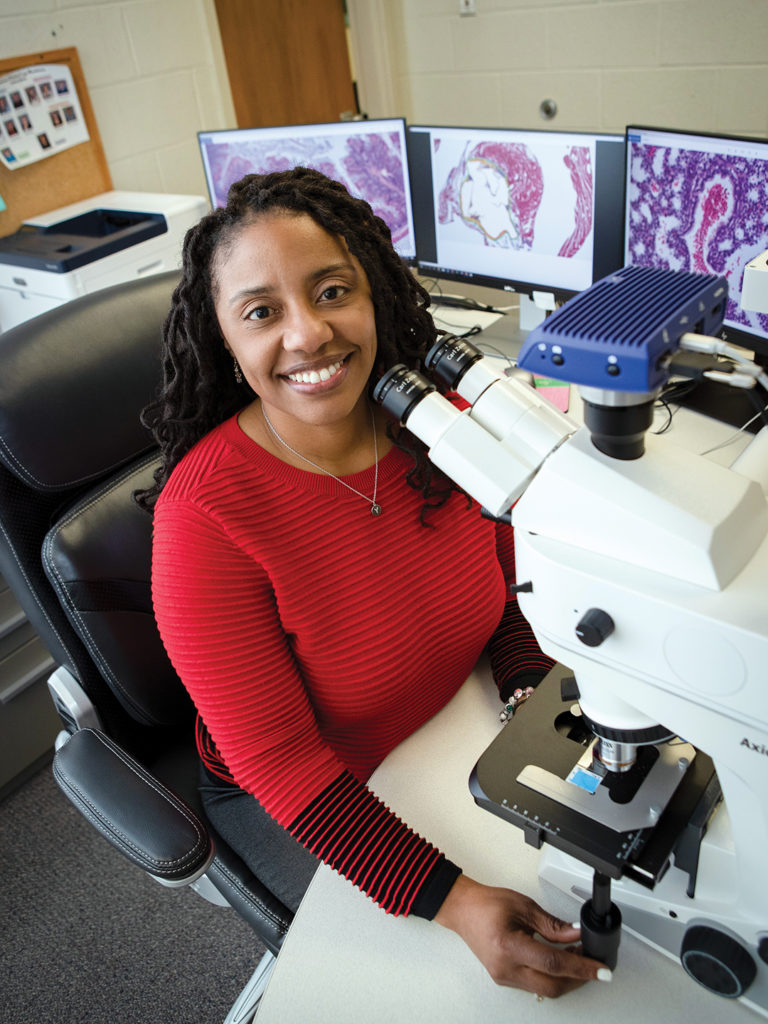CVMBS Veterinary Pathologist Promotes Diversity, Inclusion Within Veterinary Medicine
Story by Megan Myers, CVMBS Communications

Dr. Yava Jones-Hall, an associate professor at the Texas A&M College of Veterinary Medicine & Biomedical Sciences (CVMBS), is leading in the field of veterinary medicine as the only veterinarian selected for CrossTalk’s list of 100 inspiring Black scientists in America.
Created to encourage and emphasize the importance of diversity in science, the list offers an example of the impact Black scientists can have on America, according to Cell Press, the scientific journal publisher that generated the list.
Jones-Hall is joined on the list by scientists from African, Afro-Caribbean, Afro-Latinx, and African-American backgrounds ranging from assistant professors to department heads at universities across the country.
“It was surprising and amazing to be selected, especially being a veterinarian,” Jones-Hall said. “It was nice to see veterinary medicine represented.”
Jones-Hall noted that one similarity between most of those on the list is that they all seem to be navigating the tenure track system at predominantly white institutions.
Coming from a career at the Purdue University College of Veterinary Medicine to Texas A&M, both historically white universities, Jones-Hall recognizes the need for greater diversity on college campuses, not only in terms of ethnicity, but socioeconomic background as well.
“The reality is, the world is not homogenous. We need our students to be exposed to different types of people in order for them to have more cultural sensitivity and understanding,” Jones-Hall said. “Also, having diversity within any program promotes diversity of ideas.”
The Importance Of Equal Exposure
While many veterinarians develop their passion for medicine early on, especially with the popularity of veterinary-themed TV shows, Jones-Hall did not have that opportunity growing up in the small town of Childersburg, Alabama.
“Growing up, my mother was a single parent and I didn’t really have access to programs that focused on veterinary medicine. I didn’t even know any veterinarians, personally,” Jones-Hall said.
“The reality is, the world is not homogenous. We need our students to be exposed to different types of people in order for them to have more cultural sensitivity and understanding.”
DR. YAVA JONES-HALL
“When I applied to veterinary school (at the Tuskegee University College of Veterinary Medicine), the requirement at the time was to have one letter of recommendation from a veterinarian,” she said. “I had only had the opportunity to shadow a veterinarian once because he lived and worked about an hour and a half from me, but he had gone to Tuskegee and, thankfully, he recognized my potential and was willing to help me.”
Jones-Hall was accepted to Tuskegee and went on to earn her Doctor of Veterinary Medicine (DVM), but she recognizes that her situation could have turned out differently, not because she was less capable, but simply because she had fewer opportunities.
“At Purdue, I was a member of the admissions committee and saw powerful recommendation letters from veterinarians in students’ application packets, and I would think, ‘I may not have gotten into veterinary school if my background of experiences were compared to the background of many of the students that are applying now.’ It’s not a function of intelligence; it’s the exposure,” she said.
This realization led Jones-Hall to begin volunteering for community outreach efforts, taking any opportunity she could to promote STEM careers, and specifically veterinary medicine, to disadvantaged youth.
A Passion For Pathology

During veterinary school, Jones-Hall was introduced to the field of pathology—the study of the causes and effects of disease—and once she saw how seamlessly pathology combines with collaborative research, she was hooked.
“As a veterinary pathologist, I’m trained to understand disease in any organ in a multitude of species,” Jones-Hall said. “Whatever field of research an investigator’s in, I help them figure out how pathology is manifesting and how best to frame the research from the perspective of pathology.”
Considering herself a “veterinary detective,” Jones-Hall helps researchers at the CVMBS and other institutions look at clues in cells and body tissues to find the best way for the research to progress. Working on a variety of research topics and never knowing what will come through the door next are what make the field so appealing to her.
Jones-Hall’s main project as the director of the CVMBS Core Histology Laboratory has been the creation of a digital pathology program. Digital pathology increases the efficiency and accuracy of analyzing slides of cells to count those of the same kind, which is a typical job for a pathologist.
“Traditionally, pathologists would look at the slide and say there’s a little bit, a medium amount, or a lot of any particular data marker; it’s subjective. If you digitize slides and use a computer for analytics, the results are more reliably repeatable and less subject to interpretation,” she said. “Whereas it would take me weeks to look at hundreds and hundreds of slides, I can scan those same slides and design a program to identify all the T cells in the tissue, for example. I can have results in hours to days, which can then be combined with other endpoints to give a more holistic and objective picture.”
Commitment To An Inclusive Community
Outside of the lab, Jones-Hall continues her commitment to diversity and inclusion by participating in working groups to increase outreach to the local community. She also represents faculty from the Department of Veterinary Pathobiology (VTPB) in the college’s new Committee For Inclusion, Diversity, Equity, & Accountability (C-IDEA), which works to foster a welcoming and respectful environment for all faculty, staff, and students while supporting strategic initiatives being led from the CVMBS Office for Diversity & Inclusion.
“I’m very excited about the new C-IDEA initiative,” Jones-Hall said. “This committee will foster diversity and inclusivity at all levels. In particular, having the buy in and representation of staff and faculty is important. We can’t just place students into spaces that may be hostile without first having strategies, best practices, and support mechanisms in place within the faculty, staff, and administration.”

Beyond the college, Jones-Hall is a member of Texas A&M’s STRIDE (Strategies and Tactics for Recruiting to Improve Diversity and Excellence) Committee, leading workshops for faculty members involved in faculty recruitment. Most recently, she was selected to join Texas A&M’s search committee for the next president of the university.
“I was honestly shocked when I was asked to serve on the presidential search committee,” Jones-Hall said. “This will be an amazing opportunity to serve and learn the process of hiring an upper-level administrator.
“Diversity and inclusivity are important, in general, and it’s important to me, so I’m willing to take on the extra stress and work to make things better, hopefully,” she said. “If you can change one or two people, then who knows what kind of long-lasting impact that can have or who that change can spread to. That person may have encounters with a lot of students or faculty members and just that one person being different could change the climate of a whole department or community.”
Jones-Hall hopes her CrossTalk recognition might inspire others to think about those who may not have had the same advantages.
“I know the harsh reality that a lot of people face just trying to survive,” she said. “Some students might be focused on how to buy this book or what conference to go to, but other students are focused on how to eat today while still attending classes. I hope that I can inspire people to try to have success in their lives while not forgetting that other people may need you, need help along their way, or most importantly, just need a fair and equitable opportunity.”
###
Note: This story originally appeared in the Spring 2021 edition of CVMBS Today.
For more information about the Texas A&M College of Veterinary Medicine & Biomedical Sciences, please visit our website at vetmed.tamu.edu or join us on Facebook, Instagram, and Twitter.
Contact Information: Jennifer Gauntt, Director of CVMBS Communications, Texas A&M College of Veterinary Medicine & Biomedical Sciences; jgauntt@cvm.tamu.edu; 979-862-4216


